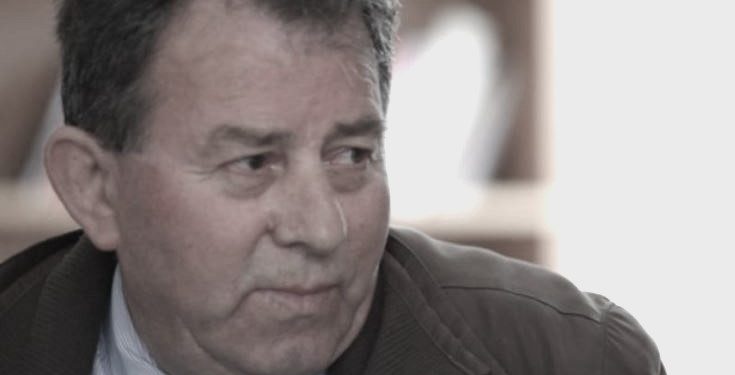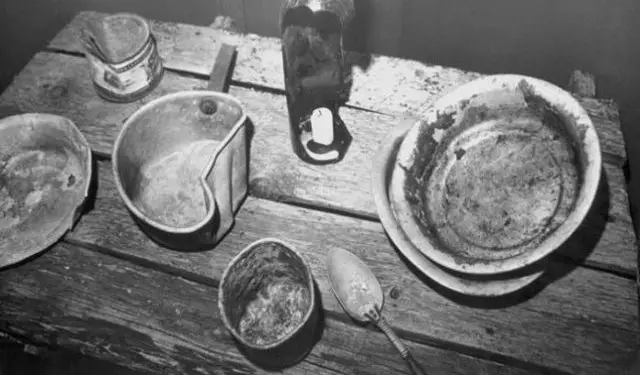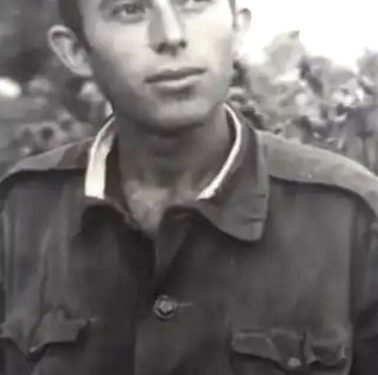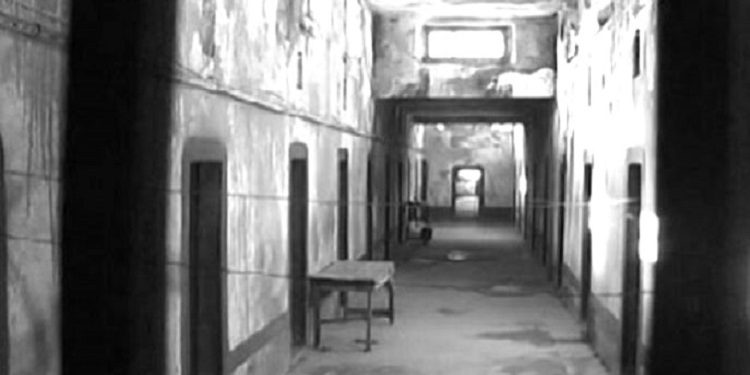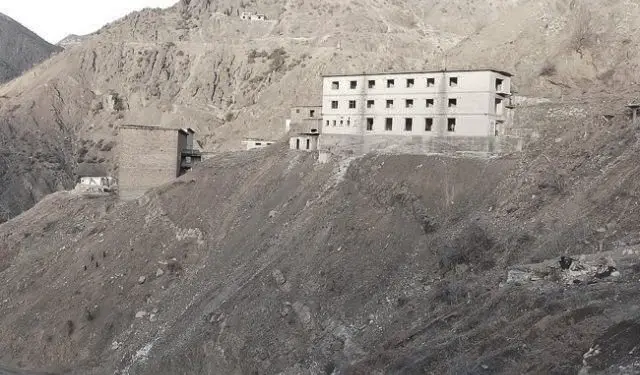By Shkëlqim Abazi
Part forty-seven
Memorie.al / I were born on December 23, 1951, in the black month, of the time of mourning, under the blackest communist regime. On September 23, 1968, the sadistic chief investigator, Llambi Gegeni, the ignorant investigator Shyqyri Çoku, and the cruel prosecutor, Thoma Tutulani, massacred me in the Branch of Internal Affairs in Shkodër, split my head open, blinded one of my eyes, deafened one of my ears, and after breaking several of my ribs, half of my molars, and the thumb of my left hand, they took me to court on October 23, 1968, where the wretched Faik Minarolli gave me a ten-year political prison sentence. After my sentence was halved because I was still a minor, sixteen years old, they took me to the Reps political camp on November 23, 1968, and from there, on September 23, 1970, to the Spaçi camp, where on May 23, 1973, during the revolt of political prisoners, four martyrs were sentenced to death and executed by firing squad: Pal Zefi, Skënder Daja, Hajri Pashaj, and Dervish Bejko.
On June 23, 2013, the Democratic Party lost the elections, a perfectly normal process in the democracy we claim to have. But on October 23, 2013, the General Director of the “Rilindase” (Renaissance) Government sent Order No. 2203, dated 23.10.2013, for the “Dismissal of a police employee.” Thus, Divine Providence was intertwined with the neo-communist Rilindase Providence, and precisely on the 23rd, I was replaced, no less and no more, by the former Sigurimi (Secret Police) operative of Burrel Prison. Could anything be more telling than that?! The former political prisoner is replaced by the former persecutor!
The Author
SHKËLQIM ABAZI
R E P S I
(Forced Labor Camp)
The First Meeting
(The Boat Sunk in the Mooring)
What, then, was the naked truth of this tragi-comedy? Here it is, according to their own words: “Vlorë and its sub-districts, especially the villages of Shushica River, Kurvelesh, and particularly the Tragjas-Radhimë-Dukat belt, are inhabited by proud and brave villagers, according to their own concept of these virtues. The population of that area is combative but also boastful; they have ‘chests with a hollow from hitting them too hard with their fists,’ as they say around here. I have heard them say: ‘If Lenin was Albanian, he’d be from Vlorë, because he has a hollow chest and a pointed beard’!”
“In every epoch of history, these regions have produced distinguished heroes, just as they have produced famous thieves, to the extent that the motto: ‘A boy who isn’t clever enough to steal can’t be clever enough for a family,’ prevailed until recently in arranging marriages. Nonetheless, through these qualities, a population with strong nationalist feelings has been educated, irrevocably tied to the land, which love and are proud of their origins, so much so that in every neighborhood, they sing songs for the rocks, ridges, and streams of the village, and for the heroism of the area’s brave men, even celebrating the most ordinary acts.”
“The boastful inhabitants of this sub-district believe that every decisive event must pass through their village, if not their courtyard threshold! As such, the shepherd in the pen, the farmer in the field, and the old men and women by the hearth, all claim to be abreast of the latest events, especially those they consider monumental for the future course of the nation’s destiny. Only in these parts does it happen that a father orders his clean-shaven son: ‘Get up, son, and go down to the city for once to hear what’s happening in that town, because these matters won’t be settled without your rifle and your word!’ He’d give him a rifle, a bag of bullets, some bread with cottage cheese and onions, and anxiously await the news. He was more concerned about how the government’s affairs would go than about the mandate his son might receive.”
“Even the visit of the great figure of world communism could not pass without attracting the attention of these rabble-rousers. This visit was interpreted in various ways by different individuals. One saw it as the end of imperialism and the triumph of world communism and boasted: ‘Without visiting Vlorë, success could not be achieved.’ Another would say: ‘It’s us, then it’s you!’ meaning without Vlorë, there is no people’s democracy in Europe. Someone else interpreted it as a merit of the farsighted leadership of our Party, and particularly of those originating from these sub-districts, implying the great figures of the area, Hysni and Kadri, etc.”
“But there were also those who thought that the welcoming of this rascal from Moscow with temenara (bows) implied unconditional submission to the world’s great powers: ‘That’s right, that’s right, but here in Vlorë, they’ve broken the snouts of who knows how many emperors and empires!’ Then they argued further: ‘Start from ancient Rome, the Mongols, the Slavs, the Ottomans, the second Rome and the third Rome, the German, the Greek, and now, some worthless man from the steppes of Siberia comes here to teach us what we should sow! Hey, trouble, and he even compares us to mice, no less! Oh, men of the earth, put your hands on your heads! That’s right, that’s right, but one bullet, say, from those that Selami left us, that’s what this short, bald man needs!'”
“These thoughts circulated from ear to ear and mouth to mouth those days. It wasn’t that this phenomenon was new and unknown to the combative inhabitants of these parts, as the rich folkloric sources bring us many facts about the endless number of epic songs dedicated to local or world leaders; when they considered the latter great friends, but also satirical ones when these very close friends one day turned into mortal enemies. One only needs to glance at the folklore volumes collected by my friend, Fatos Mero Rrapaj, to be convinced in how many songs the countless sultans of Turkey were praised, and in how many others they were cursed, when they were called ‘father’ and when ‘plague’? Songs of praise for the ‘liberating’ Italy and offensive ones for the ‘conquering’ one? Songs for Ismail Qemali, for Fan Noli, for Zogu, again for Italy and Germany, once as salvation and then as occupation? And later for Tito, Father Stalin, for the ‘two lions’ the world has, ‘one Asia, one Europe,’ Mao and Enver, and even for some ominous, neo-communist owls from the most remote dumps of the globe, whom no one knew even in the village where they were born?”
“So, this region had always spoken and sung this way, ever since the time of Caesar and Pompey, as if the fate of ancient Rome was played out on the borders of Vlorë? It had spoken the same way about Genghis Khan, and also about the emperors of Byzantium and the many sultans of Turkey, and similarly about Mussolini and Hitler, and also about Roosevelt, Stalin, and Churchill, as if Yalta were the ‘Topallti’ of Vlorë. In short, the same way, with words and songs, they had broken the ribs of the renegade Tito, after washing and rinsing him with the olive oil of Vlorë, this would be the end of this rascal, Khrushchev, too, after they had kissed his soles with temenara, like no one else before him!”
More or less, the people of Vlorë believe that no great politics can be made without them. It is said that: “In these sub-districts, the fates of the world are unfolded!” The two young boys joined this collective gossip. Namik had expressed: – “Ah, if only I had a rifle, and I’d put a bullet in him, pierce that belly of his, which he carries like a sack!” – “That’s right, that’s right! Man, how do you know he’s a belly-pig?” – Muço had asked him. – “To tell you the truth, I’ve never seen him, but I think he must be, from that photo at the U.N. when he banged his shoe.” – “I know, you’re not wrong, Miku, but I would enjoy piercing his sack!” – Muço had expressed his wish.
All this conversation had taken place in the ravines where the goats were grazing. As two neighbors from neighboring villages, they parted in the evening, each going to his own border. The next day when they met again on the grazing land, they had forgotten what they had said yesterday and were rambling about other things. They truly forgot what they had said the day before, but the wind took the gossip and it spread like wildfire. The attentive spy caught it on the fly and didn’t forget to deliver it hot to the area’s operative. That was enough for the masters, who cast their net in the shallows. They concocted the legend: “AS IF!” They imagined a large terrorist group, “composed of the reactionary remnants of the ‘Balli’ (National Front), along with some kulaks of the sub-district, who allegedly planned a plot against the Big Brother from Russia, intending to assassinate him and steer the Albanian ship towards Western ports.” This is what the masters wanted; with one stone, they killed three birds! They crushed the internal enemy, terrified the rebellious region, and emerged high-browed before the Great Friend from Russia as saviors and defenders of world communism.
They put the “plan” into action: They acted “AS IF” they saved Khrushchev’s life! “AS IF” they saved the cause of the revolution! “AS IF” they uncovered the well-organized enemy group! In every aspect you look at the issue, this story began with “AS IF” and was believed. In the land of legends where every myth is believed, why wouldn’t every “AS IF” be believed, no matter how crudely sewn! With “AS IF” they were arrested; with “AS IF” they were sentenced to death; with “AS IF” they were re-sentenced to death a second time, “AS IF” they had two lives, and with “AS IF” they did twenty years in prison. This “AS IF” was the ordeal that both would traverse, as the trial occasionally returned to the beginning. The farce continued even at the time I arrived in Reps.
Nevertheless, the two “AS IFs,” pardon me, the “assassins” of Khrushchev, remained in prison even after the physical death of the subject of their assassination. They completed their sentence to the very last grain, as befits a strong system where crime cannot be prescribed, even when the subject of the crime does not exist. I had the chance to know both “AS IFs,” pardon me, the “assassins,” and to have them as friends. Namik and Ilia and I parted after two years. I, as a guaranteed work animal, was sent to the holes of Spaçi; they and the other disabled, like worthless rags, were sent to the swamps of Panahor in Ballsh, to increase the number of nameless graves.
I would not meet them again because they cut the bridges between us, but spiritually I have felt them quite close. We exchanged information through convicts transferred from one camp to another. Namik was released from prison around forty years old, physically mutilated, but intellectually complete. But what was this culture worth? Communism had no need for such specimens. It needed brainwashed masses that saw with the eyes of the Party! Individuals who judged with their own brains had to have their heads cut off, or at least have their noses lowered! When he returned to his birth village, his fellow villagers greeted him with sympathy.
They respected him for the deep knowledge he possessed, but they met him with fear because of what he represented and the place he was returning from. If the braver fellow villagers openly expressed their admiration for his broad horizon, the local officials and authorities viewed him with suspicion and envy, precisely because of the difference in knowledge. Finding himself between sympathy and antipathy, like between Scylla and Charybdis, he managed to adapt; thanks to his extraordinary wisdom and intelligence, he knew how to survive the physical and psychological terror of the time. He even managed to start a family, despite the unfavorable conditions and the delay.
A courageous fairy, one of those that only that area can produce, tossed aside political prejudices with disgust and married the good and clever man. But they don’t say for nothing: “The black sheep is born black and dies black”! Bad luck followed him. Namik had no descendants. And the worst thing happened two years ago! His faithful wife, the one who nourished his hope for life, abandoned him. She died, her soul flew to paradise! When I heard about the calamity that had found him, I called my friend to express my condolences and regret for the misfortune that had struck them, and at the same time to encourage him to face this trial with dignity.
Do you know how he answered me? “My honored friend, God punished me with loneliness, humanity with lack of love, history with oblivion, but one ally has not abandoned me yet, the book! I am now working to create a museum with the books of the prison!” I wished him a long life, I can’t wait to go to girl, to visit the book museum; “Namik Zenel Hasanaj!”
I N T E R M E X O (Homage to a Friend)
Today, it’s hot. Tuesday, 12.07.2011, it’s hot…! Hot, hot! All night long, I haven’t been comfortable. Partly from the heat that kept me from sleeping, partly from a stabbing pain that torments me, starting from the tips of my toes to the base of my thighs. My muscles burn, my bones crack, they seem like ominous signs! Perhaps I am paying the price of the solitary cells in the years of my youth. At that time, I did not heed the appeal of the older ones when they advised me: “Even iron that is iron, if a drop falls on one place, it will break!”
But the young, like the north wind, I went my own way, and now time is rewarding me with this wretched rheumatism, or whatever the hell else it might be! On Sunday we had a wedding. We married my niece, my brother’s daughter. A week of celebration, I neither danced (my thighs hurt) nor ate (those five molar stubs left from Llambi Gegeni’s clubs and from the erosion of pyrite water are all ground down). Despite the insistence of my loved ones, especially my wife, to undergo medical examinations, I didn’t even bother to go to the doctor. But what will they check first, I beg you!?
“No, brother, not even the dog can catch us, we’ve collected everything! We’ve become like that rotten rag, wherever you grab it, it stays in your hand!” the words of my prison friend, Novruz Dyrmo, resonate in my ears, two months before he passed away, some years ago. So, knowing that I’ve become a “rotten rag,” I’ve tried to avoid medical visits. Because they say: “If you go to the hospital, even if you are healthy, you get sick, let alone us former prisoners! Only the psychological burden and the pungent aroma of medicines intoxicate us, like alcohol intoxicates the drunkard. Those aromas penetrate the most escaped cells of the brain and drug you like anesthesia!”
“Eh-eeh, this happens to normal people too!” says Halim Qejvani, my old prison friend. Despite the stabbing pains, I reported to work; I didn’t let on that I was sick. I finished with the morning hassles, then with the other paperwork. I closed the work with the day’s documents, answered phone calls for work matters; everyday routine actions. Usually, when colleagues ask me: how are you? I give them optimistic answers. Despite the goodwill they might demonstrate, they cannot take away my pain, no one can restore the health I lost in my youth in the cells.
Around noon, when the temperatures reached the peak of aptitude, my eyes were closing. The pains seemed to subside somewhat; fatigue and insomnia did their part, I dozed off. My ear was torn by a sudden whistle. Preng Rrapi’s whistle – fiu-friu-fiuu! “Hey, did you like the hotel?” The phone was ringing and ringing… with closed eyes, I picked up the phone. A voice in Gheg Albanian consoled me: “May your head be healthy! May you live yourself, man?” At first, I took it for a lapse, “mistakes that often happen with phone numbers in a group, like we have.” I started to tell him: “you have the wrong address,” but the caller snapped me out of the apathy where illness, insomnia, and the unbearable heat had left me:
-“Mr. Shkëlqim?” – “Yes!” – “Don Simon… left us!” – “How, how?” – “Simon Jubani, I mean!” – he added, as he realized I couldn’t find words to express myself. – “Really?!” – My voice broke! I never expected this news! I don’t know what kind of foolish conviction I had formed, anyone could die, but not Don Simon! I didn’t want to believe it could ever happen! He was a powerful man, with a solid and eternally young appearance! However, I recognized my friend Gjeka’s voice. I shook myself, pulled myself together.
I asked: – “What happened, Gjek?” – “That’s what I just said!” – “What is this calamity, man?!” He explained as much as he knew. I thanked him for the call and we hung up. Deeply shaken, I went down to the café across from the Police Directorate, to check the announcement on a screen. What seemed like a hypothesis until that moment was confirmed. Yes, it had happened! The announcement with subtitles was shown on all television stations. Don Simon had left us! From where I was sitting, I didn’t take my eyes off the apparatus, still hoping for wrong scoops by reporters, which are then denied without even apologizing. Meanwhile, an acquaintance of mine entered the café, greeted me, and without asking, sat down at the table. He glanced at the large screen opposite and turned his back: – “Man, you’ve turned yellow wax, what’s gotten into you today? Are you perhaps unable to move?” – When he noticed I wasn’t replying, he continued: – “Why the long face, as if your ships have sunk?”
-“We are all dying, my friend!” – I replied, without specifying who was dying. – “With this heat, we really died! You’re right, we can’t get enough sleep!” – He agreed, more out of custom. – “No, man, no! I’m talking about real death, not figurative! One by one, the great ones are leaving us, and we, the insignificant ones, are remaining!” – “Why, what happened?” – He turned serious. I looked at him as if he were a Martian. “Could he truly not know that Don Simon is no longer among us, has this nation become so indifferent? A standard-bearer of Christ leaves, and they pretend not to know! Oh, world, world!”
I was deeply shaken; I thought everyone should share my feelings. – “You really don’t know, Don Simon Jubani has died?” – I observed directly. – “No! When I was walking here, I saw the death notices, but I don’t think I noticed that name!” – He buried his head in his hands, lost in thought. – “Oh, oh! Are you talking about that priest from Shkodër who opened the church? Oh, oh-o-ooh!” – He added these exclamations. – “Yes, he consecrated the first mass after nearly twenty-five years! We were together in prison!” – I elaborated further. He stood up, extended his hand: – “May he has left you his blessing, and may you live long yourself!” It was the second condolence.
I ordered coffees, and he consoled me again. We finished our cups and parted. I spent the whole day in a fever; the cursed illness and the bitter news came and mingled, completely exhausting me. I returned home, the brotherhood and neighbors had learned the calamity, whoever could came, others offered condolences by phone. I didn’t close my eyes all night, death and heat in close alliance took away even that little bit of sleep. I got up in the morning with the idea of leaving for Shkodër, but my legs wouldn’t obey me, they felt cut off up to the base of my thighs. I left for work with the thought: “I’ll get out of the house, and then we’ll see what we do!” I went into Sandri’s club, where my Catholic friend, Edmond Fishta, was waiting for me.
Years ago he had accompanied me to Shkodër for the final farewell of Father Zef Pllumi. We greeted each other as usual. Mondi, standing, asked me: – “What time are we leaving? I waited for you to call me! The car is ready! I thought we’d leave earlier. I’ve been here since the crack of dawn!” – “I know you waited for me! Maybe you hoped we’d leave quickly, but my health condition doesn’t allow for long journeys,” – I replied. Then I explained what I was feeling. He understood, and meanwhile, saddened, he offered his condolences. There was no need to guess; grief poured out everywhere. Above every pore on his face was written: pain!
But the tongue goes where the tooth hurts; meanwhile, the conversation shifted from the pain of death to the old acquaintance. The question was a question, as light as it was simple! But not the answer! It resembled a chain with cannonballs hanging, tied to the legs of the condemned man, bleeding the joints and increasing the torture every time they clashed. – “In what circumstances did you meet Don Simon?” – Mondi asked me. – “Very, very simply! But…” – I hesitated. That was enough for the rattling cannonballs of the rusty chains to crash me against the walls of memory, crushing the erosion of the past, bringing me back forty-two years, to the horrors of the time of onions.
A child in handcuffs appeared to me: this was me! With a box-prison-truck without light, without air, with fifteen others together, after a shattering journey that brought our intestines to our mouths, straight to the door of Burrel. I had heard talk of a slogan with large letters that was supposed to be there, at that door. On it, according to Dante, was written: “Lasciate ogni speranza, o voi chi entrate qui”! Which in communist Albanian, they had adapted: “THIS IS CALLED BURREL, WHERE YOU ENTER AND DON’T LEAVE!” I’m not sure, maybe these could have been hallucinations caused by the shattering of the box-prison; because I never managed to verify whether this sentence had ever been written or not?
But this fact was of little importance, it truly was HELL past HELL! I would learn this on the very first day. Unfortunately, when they sent us from the camp, I was the first one put in the car, so in the HELL of Burrel, it was my turn to get out last. Partly blinded by the sudden light, partly from the numbness in my legs from the long journey, I wasn’t quick enough, and the policeman waiting for us took my clumsiness as a mockery and a slight to his person. Thus, instead of being put in the prison rooms with the others, I ended up in the prison cells with the mice.
So, the bad luck started right from the beginning! And this bad luck introduced me to Don Simon. In fact, I didn’t have the chance to meet him personally, but my bedding was arranged next to his bunk. After three days of isolation, they took me out; directly from the cell, I went where they led me. At the door of the room, a stocky man greeted me with a smile. He wished me welcome and showed me the bed: – “Welcome, man, and may good fortune come to you! Even though you haven’t started off very well!” I greeted him and sat on the bunk. Others, whom I didn’t know, approached me, offered their greetings, and left, while the stocky man remained there. I found only two acquaintances in that room, Luan Koka from Vlorë and Shuaip Seiti from Shkodër; I had come with them from Reps, I was seeing the others for the first time.
There I also met two patriots from my region of Berat, Ilia Thereska and Luftar Çala. The acquaintance of that day was limited to those four. Nevertheless, my bunkmate would not be any of my acquaintances, but Simon, I would later learn he was a priest and should be addressed by his title. When he confirmed he was a priest, I was not easily convinced, because he did not resemble any other priest I had known until then. All the others looked like sufferers, they were pale to the point of fading; on the contrary, this ruddy-faced man had the body of an athlete, like sportsmen. I had hit the nail on the head, I was not wrong! From my conversations with him, I learned that before he was ordained a priest, in his youth, he had been an athlete, even a quite skilled one; his fellow citizens confirmed this to me. Memorie.al




